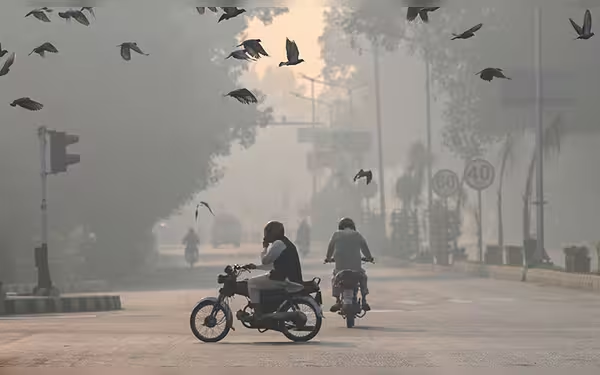Thursday, November 7, 2024 03:25 AM
Lahore Air Pollution Levels Soar 80 Times Above WHO Standards
- Lahore's air quality exceeds WHO limits by 80 times.
- PM2.5 pollutants peaked at 1,067 micrograms per cubic meter.
- New restrictions implemented to combat severe smog crisis.
 Image Credits: dawn
Image Credits: dawnLahore's air pollution levels have reached alarming heights, exceeding WHO limits by 80 times, prompting urgent government action.
Air pollution has become a pressing issue in Lahore, with recent reports indicating that pollution levels have soared to alarming heights. On Saturday, the air quality in Lahore was recorded at more than 80 times above the acceptable limit set by the World Health Organisation (WHO). This shocking statistic highlights the severity of the air quality crisis in the city, which has been shrouded in thick smog for several days.
The smog in Lahore is a dangerous mix of fog and pollutants, primarily caused by low-grade diesel fumes, smoke from seasonal agricultural burning, and the effects of winter cooling. The concentration of PM2.5 pollutants, which are tiny particles that can penetrate deep into the lungs and cause serious health issues, peaked at a staggering 1,067 micrograms per cubic meter. To put this into perspective, the WHO considers anything above 10 micrograms to be unhealthy.
Jahangir Anwar, a senior official from the environmental protection agency in Lahore, expressed his concern, stating, "We have never reached a level of 1,000." He further warned that the air quality index is expected to remain high for the next three to four days, indicating that residents should take precautions to protect their health.
In response to this environmental crisis, the Punjab Environmental Protection Agency has implemented new restrictions in four identified "hot spots" within the city. Additionally, all "Schools of Special Education" in Lahore have been ordered to send students with medical conditions that could be aggravated by poor air quality on a three-month compulsory leave starting Friday.
As discussions in the Punjab Assembly continue regarding smog and water scarcity, both government and opposition members are advocating for stricter measures to curb industrial and vehicular emissions. Among the proposed actions are the banning of tuk-tuks with polluting two-stroke engines and the prohibition of restaurants that barbecue without proper filters. Furthermore, government offices and private companies will require half of their staff to work from home starting Monday, while construction work has been halted. Street vendors, who often cook over open fires, are also mandated to close by 8 PM.
Smog is particularly problematic during the winter months when cold, dense air traps emissions from the low-quality fuels used in vehicles and factories at ground level. This situation not only poses a significant health risk to the residents of Lahore but also raises concerns about the long-term environmental impact.
As Lahore grapples with this environmental crisis, it is crucial for residents to stay informed and take necessary precautions. Simple actions, such as wearing masks outdoors and limiting time spent in polluted areas, can help mitigate health risks. Moreover, it is essential for the government and citizens alike to work together in finding sustainable solutions to combat air pollution, ensuring a healthier future for all.













